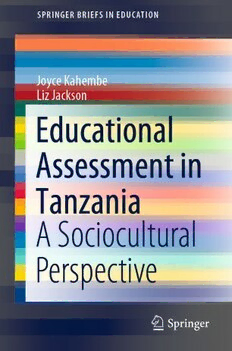
Educational Assessment in Tanzania: A Sociocultural Perspective PDF
Preview Educational Assessment in Tanzania: A Sociocultural Perspective
SPRINGER BRIEFS IN EDUCATION Joyce Kahembe Liz Jackson Educational Assessment in Tanzania A Sociocultural Perspective 123 SpringerBriefs in Education We are delighted to announce SpringerBriefs in Education, an innovative product type that combines elements of both journals and books. Briefs present concise summaries of cutting-edge research and practical applications in education. Featuring compact volumes of 50 to 125 pages, the SpringerBriefs in Education allow authors to present their ideas and readers to absorb them with a minimal time investment. Briefs are published as part of Springer’s eBook Collection. In addition,Briefsareavailableforindividualprintandelectronicpurchase. SpringerBriefs in Education cover a broad range of educational fields such as: Science Education, Higher Education, Educational Psychology, Assessment & Evaluation,LanguageEducation,MathematicsEducation,EducationalTechnology, MedicalEducationandEducationalPolicy. SpringerBriefstypicallyofferanoutletfor: (cid:129) An introduction to a (sub)field in education summarizing and giving an over- viewoftheories,issues,coreconceptsand/orkeyliteratureinaparticularfield (cid:129) A timely report of state-of-the art analytical techniques and instruments in the fieldofeducationalresearch (cid:129) Apresentationofcoreeducationalconcepts (cid:129) Anoverviewofatestingandevaluationmethod (cid:129) Asnapshotofahotoremergingtopicorpolicychange (cid:129) Anin-depthcasestudy (cid:129) Aliteraturereview (cid:129) Areport/reviewstudyofasurvey (cid:129) Anelaboratedthesis Bothsolicitedandunsolicitedmanuscriptsareconsideredforpublicationinthe SpringerBriefsinEducationseries.Potentialauthorsarewarmlyinvitedtocomplete and submit the Briefs Author Proposal form. All projects will be submitted to editorialreviewbyeditorialadvisors. SpringerBriefsarecharacterizedbyexpeditedproductionscheduleswiththeaim for publication 8 to 12 weeks after acceptance and fast, global electronic dissemination through our online platform SpringerLink. The standard concise authorcontractsguaranteethat: (cid:129) anindividualISBNisassignedtoeachmanuscript (cid:129) eachmanuscriptiscopyrightedinthenameoftheauthor (cid:129) theauthorretainstherighttopostthepre-publicationversiononhis/herwebsite orthatofhis/herinstitution Moreinformationaboutthisseriesathttp://www.springer.com/series/8914 · Joyce Kahembe Liz Jackson Educational Assessment in Tanzania A Sociocultural Perspective JoyceKahembe LizJackson TanzaniaInstituteofEducation DepartmentofInternationalEducation Dar-es-Salaam,Tanzania EducationUniversityofHongKong HongKong,HongKong ISSN2211-1921 ISSN2211-193X (electronic) SpringerBriefsinEducation ISBN978-981-15-9991-0 ISBN978-981-15-9992-7 (eBook) https://doi.org/10.1007/978-981-15-9992-7 ©TheAuthor(s),underexclusivelicensetoSpringerNatureSingaporePteLtd.2020 Thisworkissubjecttocopyright.AllrightsaresolelyandexclusivelylicensedbythePublisher,whether thewholeorpartofthematerialisconcerned,specificallytherightsoftranslation,reprinting,reuse ofillustrations,recitation,broadcasting,reproductiononmicrofilmsorinanyotherphysicalway,and transmissionorinformationstorageandretrieval,electronicadaptation,computersoftware,orbysimilar ordissimilarmethodologynowknownorhereafterdeveloped. Theuseofgeneraldescriptivenames,registerednames,trademarks,servicemarks,etc.inthispublication doesnotimply,evenintheabsenceofaspecificstatement,thatsuchnamesareexemptfromtherelevant protectivelawsandregulationsandthereforefreeforgeneraluse. Thepublisher,theauthorsandtheeditorsaresafetoassumethattheadviceandinformationinthisbook arebelievedtobetrueandaccurateatthedateofpublication.Neitherthepublishernortheauthorsor theeditorsgiveawarranty,expressedorimplied,withrespecttothematerialcontainedhereinorforany errorsoromissionsthatmayhavebeenmade.Thepublisherremainsneutralwithregardtojurisdictional claimsinpublishedmapsandinstitutionalaffiliations. ThisSpringerimprintispublishedbytheregisteredcompanySpringerNatureSingaporePteLtd. The registered company address is: 152 Beach Road, #21-01/04 Gateway East, Singapore 189721, Singapore About This Book InAfricansocieties,educational reformisheld asakey toeconomic and political flourishing. In relation, adjusting assessment practices to be more oriented toward cultivating student learning has become a popular tactic and part of educational reform efforts, in African countries and around the world. However, such educa- tionalreformsarenotalwayseffectivelyimplemented.Asteachersareonthefront- lines of reform implementation, understanding their views and practices can help illuminatethechallengesofeducationalreformatthegroundlevel.Thisbookexam- ines teachers’ conceptions and practices of assessment in Tanzania. It employs a sociocultural perspective to reveal how Tanzanian teachers understand the role of assessment in relation to their classroom practices, and cultural and other factors. ThisbookshowsthatteachersinTanzania,viewassessmentasusefulforevaluating andmonitoringlearning,improvingstudentperformance,andforaccountability.Yet teachers’ assessment practices are rarely seen to directly support student learning. In this context, it is not the case that teachers lack knowledge of how to imple- mentmandatedassessmentreform.Instead,theyarereluctanttoadoptandembrace reforms as they see them as contradictory to their teaching roles and expectations relatedtohigh-stakestesting,andoverlyburdensomegiventheirmaterial,economic, andculturalreality. Thisbookarguesthatimprovingtraditionalassessmentpractices,ratherthanradi- callytransformingthem,canbemoreeffectiveforcultivatingpracticessuitingthe material, political, economic, and cultural context of Tanzanian schools. The text will be of value to educators and scholars interested in development and educa- tional reform in African contexts. It highlights the significance of sociocultural factors in educator professional practice, while it illustrates the major challenges inimplementingglobalreformagendasindiversecontexts. v Contents 1 Introduction .................................................... 1 1.1 Background ................................................ 1 1.2 ResearchQuestionsandSignificance ........................... 6 1.3 ResearchDesign ............................................ 8 1.4 OverviewoftheText ......................................... 12 References ...................................................... 13 2 TanzanianEducationandthePurposesofAssessment .............. 17 2.1 EducationalHistoryinTanzania ............................... 17 2.1.1 TheColonialPeriod ................................... 17 2.1.2 EducationSinceIndependence .......................... 19 2.2 AssessmentinTeachingandLearning .......................... 25 2.2.1 AssessmentApproaches ............................... 25 2.2.2 AssessmentPractices .................................. 27 2.2.3 PastStudiesofAssessment ............................. 30 2.3 Conclusion ................................................. 32 References ...................................................... 32 3 ConceptionsinEducation:ASocioculturalApproach ............... 37 3.1 ConceptionsandConceptualisations ........................... 37 3.2 TheoreticalPerspectives ...................................... 38 3.3 TheImportanceofContextinEducation ........................ 40 3.3.1 TheImportanceofNationalAssessment .................. 41 3.3.2 TheImportanceoftheMaterialEnvironment .............. 43 3.3.3 TheImportanceofCulture ............................. 44 3.4 HowConceptionsImpactEducation ............................ 45 3.4.1 HowConceptionsImpactTeacherPractices ............... 45 3.4.2 TheImpactofTeacherPracticesonStudentExperiences .... 48 3.5 Conclusion ................................................. 50 References ...................................................... 50 vii viii Contents 4 Teachers’AssessmentConceptionsandPractices ................... 55 4.1 Teachers’ConceptionsofAssessment .......................... 55 4.1.1 Assessing and Monitoring Student Understanding, Progress,andAchievement ............................. 56 4.1.2 AssessmentforImprovement ........................... 60 4.1.3 AssessmentforAccountability .......................... 64 4.1.4 ContradictoryConceptionsandPractices ................. 66 4.2 AssessmentPractices ........................................ 73 4.2.1 Questioning .......................................... 73 4.2.2 Feedback ............................................ 75 4.3 InfluencesonTeachers’ConceptionsandPractices ............... 78 4.3.1 TheNationalEducationAssessmentSystem .............. 78 4.3.2 TheEducationManagementSystem ..................... 79 4.3.3 TheMaterialEnvironment .............................. 80 4.3.4 Culture .............................................. 81 4.4 Conclusion ................................................. 82 5 Conclusion ..................................................... 85 5.1 Summary ................................................... 85 5.2 EducationalImplications ..................................... 87 5.2.1 TheoreticalImplications ............................... 89 5.2.2 ImplicationsforPolicyMakersandAdministrators ........ 90 5.2.3 ImplicationsforTeachersasReformImplementers ......... 91 5.2.4 ImplicationsforFutureResearch ........................ 92 5.3 Recommendations ........................................... 92 5.4 Conclusion ................................................. 94 References ...................................................... 94 About the Authors JoyceKahembe is presently a Principal Curriculum Coordinator at the Tanzania InstituteofEducation.Formerly,sheworkedasthePrincipalExaminationOfficerfor 12 years at the National Examination Council of Tanzania. She studied Education and Psychology at the University of Dar-es-salaam, Tanzania. Later, she studied EducationMeasurement,Assessment,andEvaluation attheUniversityofTwente, TheNetherlands,andEducationPolicyandAdministrationintheareasofcurriculum andassessmentattheUniversityofHongKong. LizJackson is a Professor in the Department of International Education at the EducationUniversityofHongKong.SheisalsothePresidentofthePhilosophyof EducationSocietyofAustralasia,andtheformerDirectoroftheComparativeEduca- tionResearchCentreattheUniversityofHongKong.Herpastauthoredbooksinclude MuslimsandIslaminUSEducation:ReconsideringMulticulturalism,Questioning Allegiance:ResituatingCivicEducation,BeyondVirtue:ThePoliticsofEducating Emotions,andContestingEducationandIdentityinHongKong. ix Chapter 1 Introduction Abstract Thischapterincludesbackgroundinformationaboutthetopicofassess- mentreformandgivesabasicaccountofitsimportanceinTanzania.Itbrieflyexplains thestudyattheheartofthistext,whyitisimportant,howitrelatestopastworkon educationassessmentreform,andthebasicresearchquestionsanddesign. · · · · Keywords Tanzania Curriculumreform Assessment Conceptions Teachers 1.1 Background In 2005, the Ministry of Education in Tanzania through its Institute of Education introduced competency-based curriculum (TIE, 2005). The introduction of this curriculum required a renewed focus on student needs and teacher support of learningprocesses(Woods,2007).Movingtowardalignmentwithglobalstandards and the priorities of international donors, each element of the reform emphasised student-centred approaches. Thus, the reform was implemented concurrently with newrecommendationsforteachingpedagogiesandassessmentpractices.Formative assessment was concurrently mandated, for teachers to better scaffold student learningandengagestudentsincompetencydevelopmentprocesses,andtoenable studentstoreflectuponandregulatetheirlearning(TIE,2005). Formative assessment practices were crucial within the curriculum because they assert the importance of using assessment during teaching and learning to elicitinformationasevidencefordiagnosingandimprovingteachingandlearning processes(Black,HarrisonLee,Marshall,&Wiliam,2003).Formativeassessment practices were thus held as essential to the implementation of the reform, so that teachers could engage students in learning processes and continuously gather informationaboutclassroomandeducationalprocesses.Formativeassessmentalso facilitates more dialogic practices and use of assessment evidence for increasing student participation and giving students space for developing their own personal competencies(Woods,2007). Theintroductionofformativeassessmentmethodsalsomeantthereplacementof oldteachingandassessmentpractices.TeachersinTanzania,aselsewhere,havetradi- tionallyassessedstudentsattheendofteaching,toevaluateachievementoflearning ©TheAuthor(s),underexclusivelicensetoSpringerNatureSingaporePteLtd.2020 1 J.KahembeandL.Jackson,EducationalAssessmentinTanzania, SpringerBriefsinEducation,https://doi.org/10.1007/978-981-15-9992-7_1
